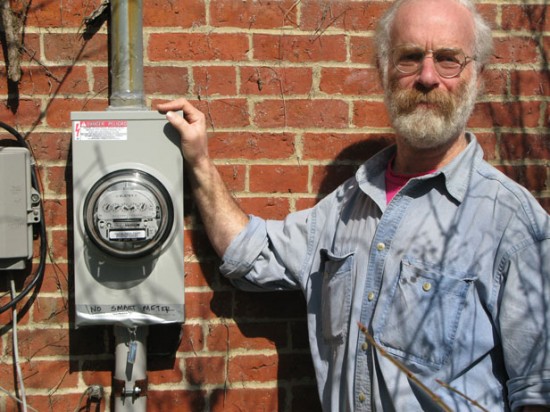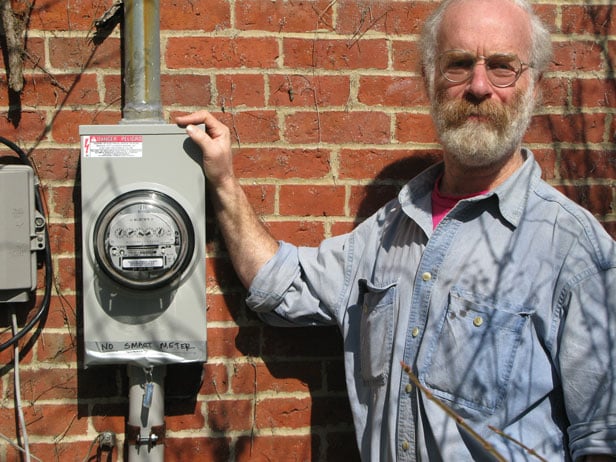Business Impact
Rage Against the Smart Meter
Seeing Big Brother in the grid, some citizens are mounting opposition to wireless electricity meters.



Ed Friedman doesn’t mind the tinfoil-hat jokes. Just don’t install a smart meter on his house.
From his home in Bowdoinham, Maine, the helicopter pilot and environmental activist is leading opposition to digital electrical meters being installed by the local utility, Central Maine Power. The new devices, which use wireless radios to transmit data about electricity consumption, are touted as a critical component of a more intelligent electrical grid. With smart meters, consumers could track the price of electricity in real time, and utilities could lay off tens of thousands of meter readers.
Friedman, who carries a radio-frequency analyzer that emits frightening crackles around cell phones and Wi-Fi routers, says smart meters are a dangerous idea. They are an invasion of privacy and might even cause illness, he has alleged in a legal complaint set to be heard by the Maine Supreme Court next month.
“My home is my castle,” says Friedman. “And they want to receive and transmit from it without asking permission.”
Central Maine Power began installing the digital meters last year and has now put them on around 610,000 homes and businesses, including most residences in Maine. Spurred by several billion dollars in smart-grid incentives passed as part of the 2009 economic recovery act, utilities across the United States are quickly moving ahead with similar plans.
But the sudden appearance of the technology has sparked a national opposition movement, and poor communication by the utilities has not helped matters. In 2010, county officials in Marin County, a liberal bastion in California, voted to block the meters over health concerns. In Texas, Tea Party activists and militia members are now opposing smart meters and calling them Big Brother–type spying.
“This movement has brought together really strange bedfellows,” says Josh Hart, who helps organize smart-meter opponents from his website, Stopsmartmeters.org.
Hart got involved after his girlfriend became worried about the health effects of radio waves from the meter’s transmitter. “I called the company. I said we didn’t want one. And they said ‘You don’t have a choice.’ That got my back up,” he says. A onetime computer enthusiast, he has now gotten rid of his microwave, cell phone, and home Internet router. “In this country, we have no choices about technology,” he says.
The intensity of the opposition has caught utilities flat-footed. “It was stunning to us when we ran into the response that we got. We did not see it coming,” says John Carroll, a spokesman for Central Maine Power. Customers worried that smart meters could start fires, interfere with medical devices, or even cause cancer.
So far, there is no evidence that radio-frequency energy causes cancer. Harder to dismiss are concerns about privacy. Because smart meters yield readings frequently (every 15 minutes in some cases), it’s theoretically feasible to deduce what is happening inside a home—what appliances are being used, how many people live there, even what schedules they keep. In 2011, the University of Washington showed that electrical signatures could determine if a TV in a house was playing Shrek 2 or The Lion King.
In California, meters now collect 750 to 3,000 data points per month instead of just one monthly reading, according to the Electronic Frontier Foundation, a privacy group. The EFF says it is satisfied with controls put in place by the local utility, PG&E, but spokesperson Rebecca Jeschke says strong privacy controls are needed because so much personal data can be gleaned just from electricity use. “Many third parties will want access to this sensitive information,” she says.
Local police forces are likely to be among them. Police in Ohio and other states already regularly subpoena electric bills as a way to pinpoint the location of marijuana-growing operations. Hackers may also be drawn by the devices. The FBI investigated a case in Puerto Rico in which criminals easily manipulated smart meters to avoid $400 million in bills.
To Friedman, who comes from a family of Bronx lawyers and says he has “outrage in the blood,” meters are an unwanted and, he argues, illegal, intrusion into his private life by a government-controlled monopoly. “The long-term thing is the data mining—who are they going to sell that data to?” he wonders.
Ultimately, the idea is that smart meters will provide real-time information on electricity prices. Instead of paying an average rate, consumers will be able to program smart appliances or thermostats to turn on during the night or on weekends, when power is cheapest, just as many businesses do. That could help reduce overall demand for electricity in states like Maine, where residences use about a third of the power supplied.
Those advanced applications still remain theoretical. Central Maine Power says it made economic sense to install the smart meters only because the company will be able to retire its corps of trucks and meter readers, who were driving two million miles a year to take readings. It will take the utility 15 years to cover its costs, says Carroll, even with the U.S. Department of Energy chipping in half the $192 million expense of the program.
To appease those citizens opposed to smart meters, Maine regulators last May ordered Central Maine Power to allow the “small minority” of people who don’t want the technology to opt out of the program. It’s important that not too many people refuse, since the meters operate as a mesh, transmitting data from one to another down the line. The utility is now charging an extra $12 per month fee for anyone who opts to keep the old analog meter.
That’s a decision Friedman is now fighting, too. He says the fees amount to extortion. “If you have to pay to avoid harm, what would you call that?” he says. His day in court will come on May 10, when oral arguments before the Maine Supreme Court will be streamed live over the Internet from Bangor, reaching Wi-Fi routers and smart phones around the state.